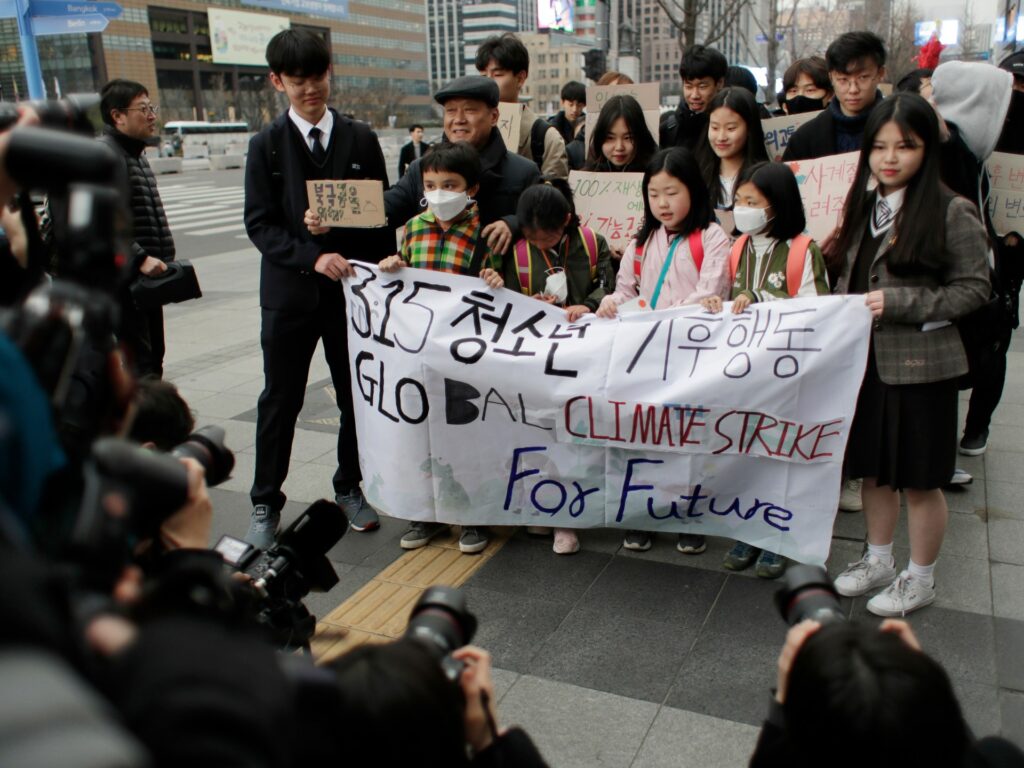As a 20-week-old fetus, Choi Hee-woo joined a landmark climate change lawsuit against South Korea, becoming one of the youngest plaintiffs in the world.
In late May, South Korea's Constitutional Court held the final hearing of the first lawsuit in East Asia to challenge the country's climate policy.
Hiu, now 18 months old, and more than 60 other children are awaiting sentencing, scheduled for later this year.
So what did their lawsuit challenge, and where does South Korea stand on climate change?
What are the climate issues facing Korean children?
South Korea's Constitutional Court has heard a landmark case that alleges the government is failing to protect its people from the harms of climate change.
Four similar climate lawsuits filed between 2020 and 2023 were consolidated in February for procedural reasons. The first hearing in the joint lawsuits was held in April, and the second and final hearings were held on May 21.
The petition about Hee-woo, called “Woodpecker vs. Korea” after his nickname while he was in the womb, was filed by around 200 people, including 62 children under the age of five.
A separate lawsuit was filed in 2020 by 19 youth activists.
The plaintiffs argue that without stronger climate change action, the government is failing in its constitutional duty to protect people's right to life and a healthy environment.
South Korea also made a legally binding international commitment under the 2015 Paris Agreement to prevent global average temperatures from rising more than 1.5 degrees Celsius (2.7 degrees Fahrenheit) this century.
The date of the verdict is unclear, but Amnesty International said the ruling is expected to be handed down later this year.
What climate agreements does South Korea have?
Under South Korea's “Carbon Neutrality” decree, the country must reduce its greenhouse gas emissions by 40 percent by 2030 compared to 2018 levels, equivalent to a reduction of 290 million tonnes.
These Nationally Determined Contributions (NDCs) are specific to each country and represent their commitment to reducing global emissions in line with the 2015 Paris Agreement.
Plaintiffs in the climate change lawsuits argue that the current targets underestimate the emissions South Korea must cut to limit rising global temperatures.
Additionally, to reach its 2030 target, the country would need to reduce emissions by 5.4% each year from 2023, a target it has so far fallen short of.
Before the cases were consolidated, three of the lawsuits challenged the emission reduction target levels set in the NDCs, and the fourth alleged that the NDCs' implementation plans were inadequate.
South Korea also aims to achieve net-zero emissions by 2050.
How does this impact South Korea's climate change efforts?
The conclusion of the case comes ahead of a deadline for countries to submit revised emissions reduction targets.
The next targets, which will be reviewed every five years under the Paris Agreement, are due by early 2025 and will cover the next decade.
If the court rules in favor of the plaintiffs, South Korea may have to come up with a more ambitious plan for its next climate change initiative, experts told Nature.
How far has South Korea progressed in combating climate change?
Currently, South Korea's Nationally Determined Contribution (NDC) is classified as “insufficient” by the Climate Action Tracker, an independent scientific project that monitors governments' progress on climate action.
South Korea will get just 5.4% of its energy from wind and solar in 2022, less than half the global average of 12% and far behind neighbors Japan and China, according to energy think tank Ember.
Moreover, South Korea has the second-highest per capita carbon dioxide emissions among the G20 countries.
What other big climate lawsuits have young people brought?
There have been many successful youth-led climate change lawsuits to date.
In 2020, nine people aged between 15 and 32 filed a challenge to the Federal Constitutional Court, arguing that the emissions reduction targets of Germany's Federal Climate Protection Act remain insufficient and violate human rights.
The following year, the court ruled in their favor, finding the country's climate change mitigation plans inadequate and could lead to “intergenerational inequity.”
In essence, the court concluded that Germans today are spending too much of the carbon budget while contributing too little to abatement efforts, leaving future generations with an excessive burden. In response, the German government moved up the deadline for achieving carbon neutrality from 2050 to 2045.
In the United States, a group of 16 people between the ages of 5 and 22 filed a lawsuit in 2020 alleging that the state of Montana was not protecting their right to a clean environment. In 2023, the court ruled in their favor, saying Montana must take climate change into account when approving fossil fuel projects.
Six young people aged between 11 and 24 also filed a lawsuit against 32 European countries in 2023, claiming that climate change threatens their rights to life, privacy and mental health. However, the European Court of Human Rights dismissed their appeal, citing the broad geographical scope of the lawsuit.


